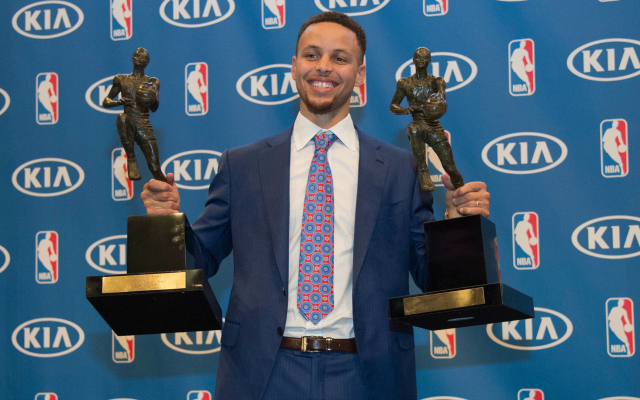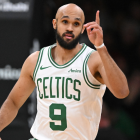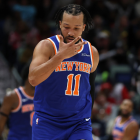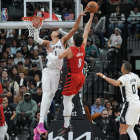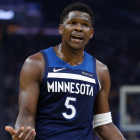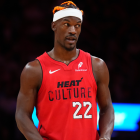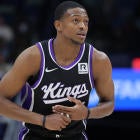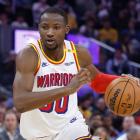It finally happened. For the first time in the 61 years of balloting, every single voter for the NBA MVP Award agreed on the winner, Warriors guard Stephen Curry. However, he's not the only player who has deserved a unanimous MVP tally.
We've seen some truly dominant seasons that not only have those campaigns but also set standards for that era and beyond. Michael Jordan is regarded as the greatest player of all-time, and aside from a few opinions of dissension, that acceptance has left its mark on generations of NBA players. But even Jordan never received 100 percent of the first-place votes for the league's MVP trophy.
He came close though, as have several other MVP winners. Let's see how Curry's historic achievement compare to the others who nearly took home every first-place vote:
1984-85 Larry Bird, Boston Celtics: Received 73 of 78 first-place votes
During Bird's run of three straight MVPs from 1983-86, he dominated the vote during the final two campaigns. Basketball Jesus twice received 73 of the 78 possible first-place votes. In 1985, Magic Johnson, Terry Cummings (two), and Michael Jordan (two) ended up with the remaining five votes. In 1986, Dominique Wilkins took the five votes Bird didn't. And he was easily the best and most valuable player -- leading the Celtics to 63 and 67 wins, two trips to the Finals and a championship.
In the '84-85 season, Bird averaged 28.7 points, 10.5 rebounds and 6.6 assists. He missed out on the 50-40-90 club by 1.8 percent from the free throw line. The only other player in NBA history to average 28-10-6.5 in a season is Oscar Robertson, who did it three times. Bird was the modern day Big O in a forward's body. Although their games are quite different, Bird and Curry are similar because they are unique. Bird was a 6-foot-9 forward who could be the main playmaker on the floor. Only Magic Johnson was capable of dominating with that perfect blend of skill set and size.
Curry's skill set is the most extreme ever, which makes his unanimous MVP at once expected and a surprise. Not everyone latches on to his never-before-seen game. Some are dazzled, and others resist while grasping for straws to explain why he's overhyped.
1985-86 Larry Bird, Boston Celtics: Received 73 of 78 first-place votes
The next season, the Celtics were one of the greatest teams in NBA history. At the time, Bird helped lead them to 67 wins and a league-record 40-1 home record. It was only the fourth time a team hadwon 67 games or more. They were two away from tying the record set by the '71-72 Lakers. Late season losses to Philadelphia and New Jersey kept them from tying that record.
The difference between Bird that season and Curry's history-making 73-win season with the Warriors is Bird did not improve individually in the encore. Even so, his stats were still impressive. But Curry improved in a manner we've rarely seen, and in almost every noteworthy metric.
It's also funny how we consider Bird (and rightfully so) to be one of the greatest shooters we've ever seen, but he played in an era in which the 3-point shot was seen as a secondary option. He hit 649 3-pointers during a 13-year career. Curry has made 688 3-pointers in his two MVP seasons. Although, Curry never got so bored that he took shots left-handed.
1995-96 Michael Jordan, Chicago Bulls: Received 109 of 113 first-place votes
I know. I know. We're not supposed to compare Jordan to anybody, let alone Curry. But this one seems relevant because '95-96 was the season Jordan and the Bulls won 72 games, the record until it was broken by Golden State this season. Even then, Jordan was not the unanimous MVP. Not sure what the hold-up was, other than maybe some agenda-driven voting from four of the 113 participants. The three players that ended up with first-place votes aside from Jordan were Anfernee Hardaway (two), Hakeem Olajuwon, and Karl Malone.
It was the best year of Hardaway's career but nowhere near what Jordan was doing. Olajuwon was absurd as usual, but his lone vote could have been retribution for being robbed of the award the previous year when he embarrassed David Robinson in the playoffs. Malone was fantastic but he was a year away from stealing Jordan's '97 MVP. The voting didn't make any sense in the historical context of what the Bulls did in Jordan's first full season back from his first retirement.
Maybe Jordan wasn't unanimous because it may not even have been one of the five best individual seasons of his career. But when looking at raw numbers like points, rebounds, assists and shooting percentages there are real similarities to Curry this season and Jordan in '95-96.
The obvious differences are shooting and defense. Jordan was one of the best defenders and Curry is simply a good defender. This was one of the rare seasons in which Jordan was a good 3-point shooter, though it coincides a period (1994-97) when the NBA moved the 3-point line in. Curry is such an elite shooter that some foolishly wonder if the line should be moved back -- as if that wouldn't separate his ability from the rest even further.
Unfortunately for Jordan fans, Curry's season in 2015-16 eclipsed what Jordan did in 1995-96. It doesn't mean you freak out and pretend this is saying Curry's accomplishments are greater than Jordan's. It's just Curry was better this season than Jordan was that season.
1999-00 Shaquille O'Neal, Los Angeles Lakers: Received 120 of 121 first-place votes
Here's how absurd it was that Shaq didn't end up with a unanimous MVP that season. That 121st vote went to Allen Iverson, who finished seventh overall. This would be the equivalent of Curry missing out on one vote and having it go to Damian Lillard. It's not that Iverson was bad by any means. He showed that heart we loved and he had a solid season. But Iverson did not lead the league in scoring that season (Shaq did), which was his main calling card. Also, his true shooting percentage was less than 50 percent, which is poor.
Here's how special Shaq's season was: 29 points, 13 rebounds, 3.5 assists and 3 blocks per game. Those averages have happened twice since the league started tracking blocks. Shaq and Kareem Abdul-Jabbar back in the mid-70's. That's the entire list. Shaq had a season we've pretty much never seen before and yet someone had to vote for Iverson as the league's MVP (he'd win it the following year). That vote should've been revoked.
It's tough to compare such entirely different players like Shaq and Curry, other than to say each was dominant. Shaq changed defensive schemes vs. his team and his team alone. Spend the majority of your energy trying to move a building out of position. Then when the building gets angry, hope your guys can foul it and make it shoot free throws. That was what you had to do against the Lakers. Gravitate toward the paint and live with the consequences elsewhere.
With Curry, the gravitational force happens from 23-40 feet away. You expend your energy defending the 3-point line and you chalk up forfeited layups and dunks to the cost of doing business against the Warriors. The advanced stats of Curry and Shaq were similar. And really Steph's unanimous MVP should've been at worst the second one to happen in NBA history. Shaq deserved this honor 16 years ago.
2003-04 Kevin Garnett, Minnesota Timberwolves: Received 120 of 123 first-place votes
If you were going to make an argument in 2004 for someone other than Kevin Garnett winning the MVP, it was going to be for Tim Duncan. The Spurs finished one win behind the Wolves for the top seed in the West, and other than assists and free throw percentage, Duncan's numbers were within shouting distance of KG's. So it would then make sense to assume the three missing votes for Garnett went to Duncan, right?
That's not what happened. Jermaine O'Neal received two votes. His stats weren't really that close to KG's but the Indiana Pacers did win 61 games that season. O'Neal was a huge part of it, but he was neither the offensive nor defensive player KG was. That's not a knock on Jermaine O'Neal, either. KG was just that good. The other vote went to Peja Stojakovic, who was having a phenomenal season in Chris Webber's absence until Webber came back. Apparently, Peja did enough in the first three quarters of the season to overshadow what KG was doing.
Only other player in NBA history to 24-13.5-5-2 is Kareem. KG was to defense what Curry is to offense -- a complete mutated game-changer. Garnett was often perched up at the top of a pseudo zone defense Flip Saunders ran. KG's responsibilities were to hound the opposing point guard, shave seconds off the shot clock, double toward the primary scorer, and then recover if there was ball movement. No one ever had a 6-13 player cover so much ground on every possession.
In the ways KG constricted the floor for the opponent, Curry's offense expands the duties of an opposing defense. Steph has the edge in a lot of the advanced metrics comparing the two seasons but the two are tied in VORP (Value Over Replacement Player).
2012-13 LeBron James, Miami Heat: Received 120 of 121 first-place votes
Much like the KG-Duncan discussion about 2004, LeBron James has one of those in 2012-13 as well. If you were going to talk yourself into someone other than James winning the MVP in 2013, it was going to be Kevin Durant. KD went 50-40-90 while also posting ridiculous averages of 28 points, nearly 8 rebounds, and over 4.5 assists. Those almost seem to be impossible numbers in every way, and that Thunder team was one of the more dominant regular season teams we've seen in terms of net rating.
But Durant didn't get the missing vote from LeBron's near unanimous voting. Carmelo Anthony did. Melo was fine that year. He led the league in scoring and it seemed like he revived the New York Knicks. It was quite the feat. However, James was better in just about every way. He made an absurd 56.5 percent of his shots and was even a deadly 3-point shooter on a fair number of attempts per game.
That season when LeBron took a shot, you expected it to go in. Every time. He was a special level of dominant we've almost never seen from another player. How much does that sound like what we say about Curry right now? The incredible thing was LeBron's 64 true shooting percentage that season almost seemed impossible to do while averaging almost 27 points. Now, you look at Curry not only invent the 50-45-90 club for a volume shooter, but his 66.9 percent true shooting is the most impressive shooting season we've ever seen.
Across the board, LeBron's advanced stats from that season mirror a lot of what Curry did this season. So why wasn't he a unanimous MVP? Lucky for Steph, the voting in these other years was just dumb enough to make him the first unanimous winner ever. Will he be the only one? Only time will tell.
